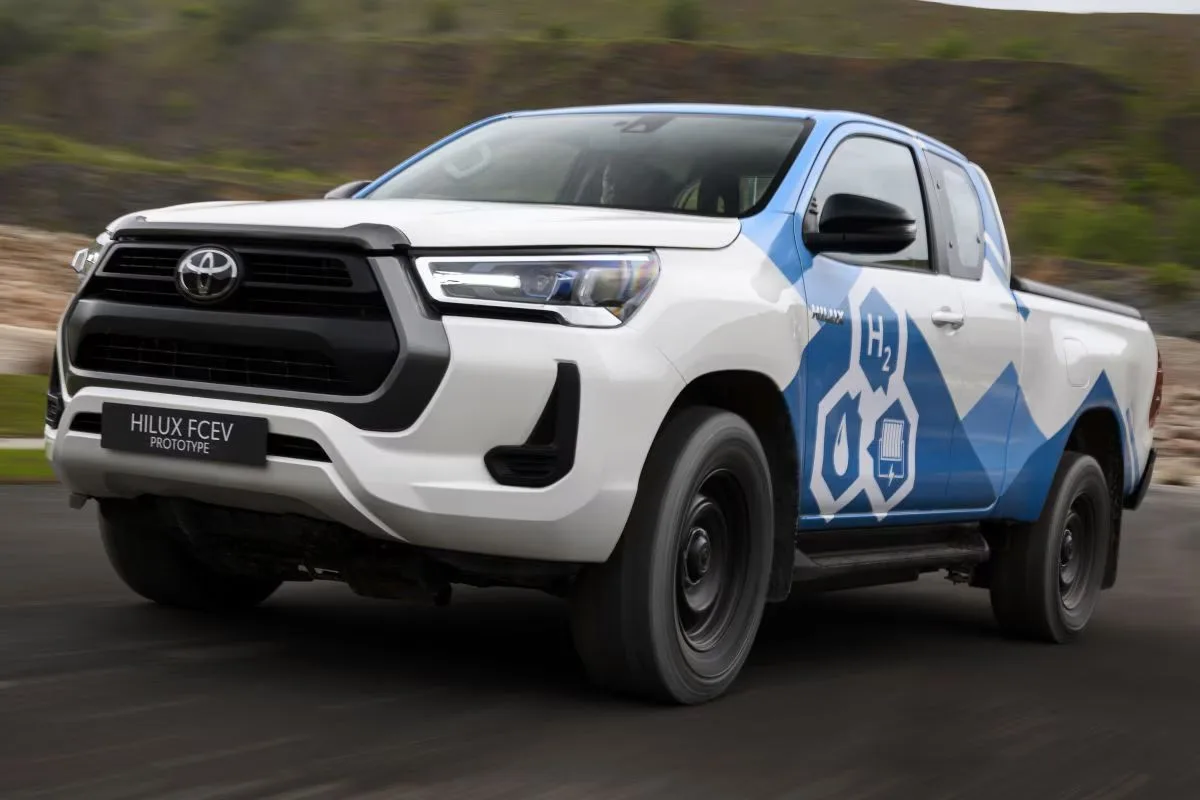
Toyota has revealed a prototype of the hydrogen fuel cell electric Hilux at its Burnaston factory, in England. Hilux has been a global icon of the Toyota brand since 1968 with a reputation for exceptional reliability and durability.
This vehicle has been developed in a joint project with consortium partners, supported by UK Government funding.
Hilux’s new powertrain uses core elements from the Toyota Mirai hydrogen fuel cell electric sedan – technology that has proved its quality in almost 10 years of commercial production.
Hydrogen is stored in three high-pressure fuel tanks When driven, the fuel cell produces no tailpipe emissions other than pure water.
Earlier Toyota has been criticized by its investors due to the slow adoption of fast-growing electric vehicle technologies. But now Toyota plans to launch 30 battery-powered vehicles by 2030 which will count 3.5 million sales worldwide using its more than 1,000 patented Solid-State battery technologies.
Toyota is aiming for a multi-path strategy for achieving carbon-free mobility, applying different powertrain solutions – hybrid electric, plug-in hybrid electric, battery electric, and fuel cell electric – to suit different user needs and operating environments worldwide and to continue its dominance in the automobile market.
The intense design and development program was started with consortium partners Ricardo (a global strategic, environmental, and engineering consultancy), European Thermodynamics (ETL), D2H Advanced Technologies (provides engineering services in simulation, modeling, aerodynamics, thermodynamics), Thatcham Research and additional support from Toyota Motor Corporation (TMC).
The first vehicle was completed in June, the first of 10 that will be built by the end of this year. These will undergo rigorous testing to ensure safety, dynamic performance, functionality, and durability meet the high standards required of a production model.
In FCEVs, energy is stored in the form of hydrogen, which is stored in onboard tanks. This stored hydrogen is then converted into electricity through the use of a specialized device known as a polymer electrolyte membrane (PEM) fuel cell.
The PEM fuel cell operates by placing an electrolyte membrane between a positive electrode, or cathode, and a negative electrode, known as an anode.
Hydrogen gas is introduced into the anode, while oxygen from the surrounding air is introduced into the cathode. Within the fuel cell, an electrochemical reaction occurs at the catalyst, causing the hydrogen molecules to split into protons and electrons.
The proton flows through the membrane while the electron flows through the external circuit to the cathode giving a continuous current to drive the installed motor of FCEVs. This is no harmful emission of gases, only water and heat comes from FCEVs.
Advantages of Fuel Cell:
This post was last modified on September 17, 2024 1:05 pm
In a major stride toward sustainable mobility, the Himachal Pradesh Police have incorporated six custom-modified Tata Curvv electric vehicles into…
In India, the automotive and transport industry is undergoing significant changes. This transformation isn't just about improving roads and infrastructure;…
Montra Electric, the clean mobility brand from the prestigious Murugappa Group, has launched the All-New Super Auto, a next-generation electric…
Union Minister Nitin Gadkari (Minister of Road Transport and Highways of India) has once again made a bold statement that’s got…
India’s electric four-wheeler (E4W) market slowed in September 2025, following a record-breaking August, with 15,038 units sold, representing an 18%…
India’s EV market hit 1,04,056 electric two-wheeler sales in September 2025. TVS, Bajaj, and Ather led the chart, while Ola…
This website uses cookies.